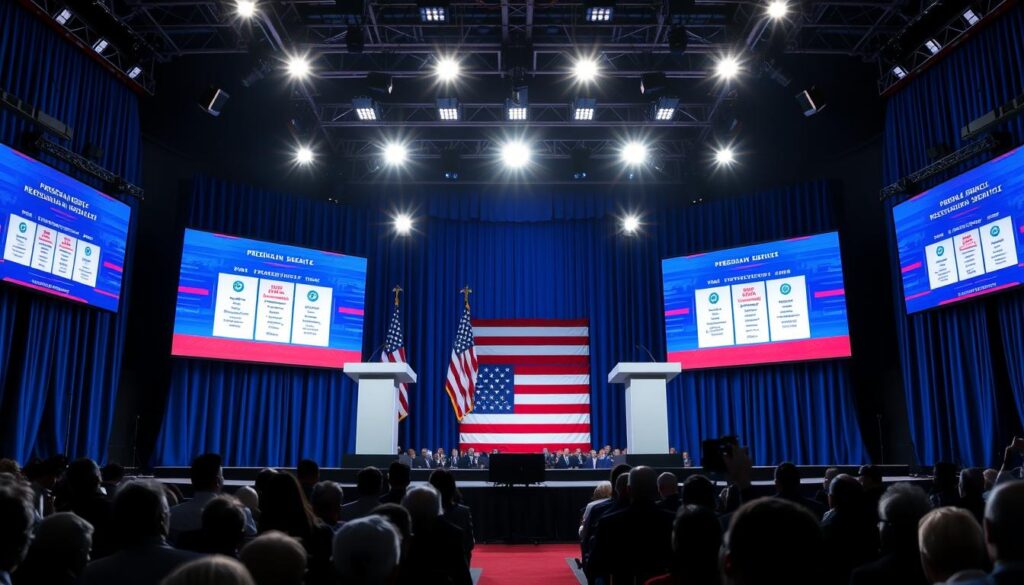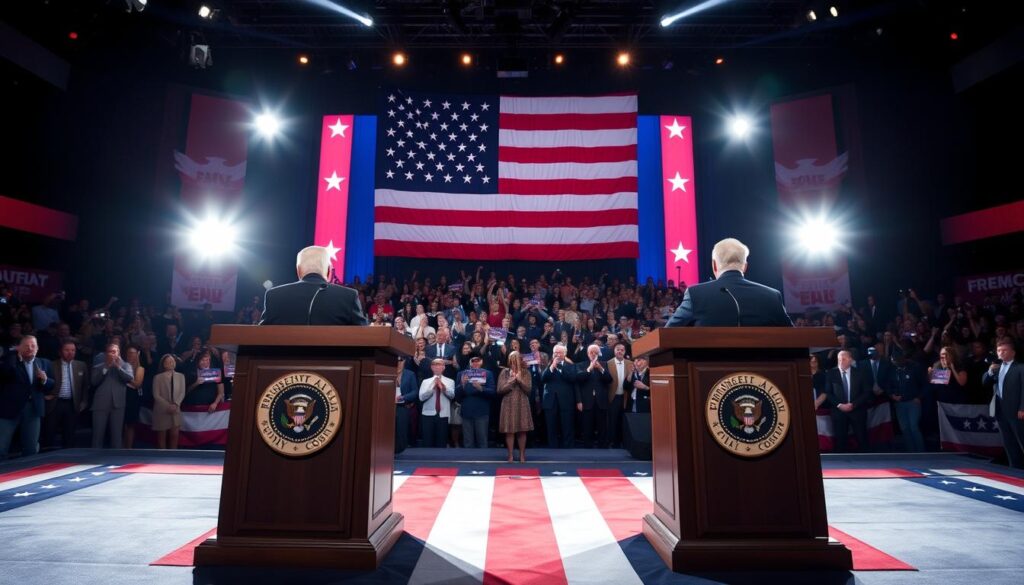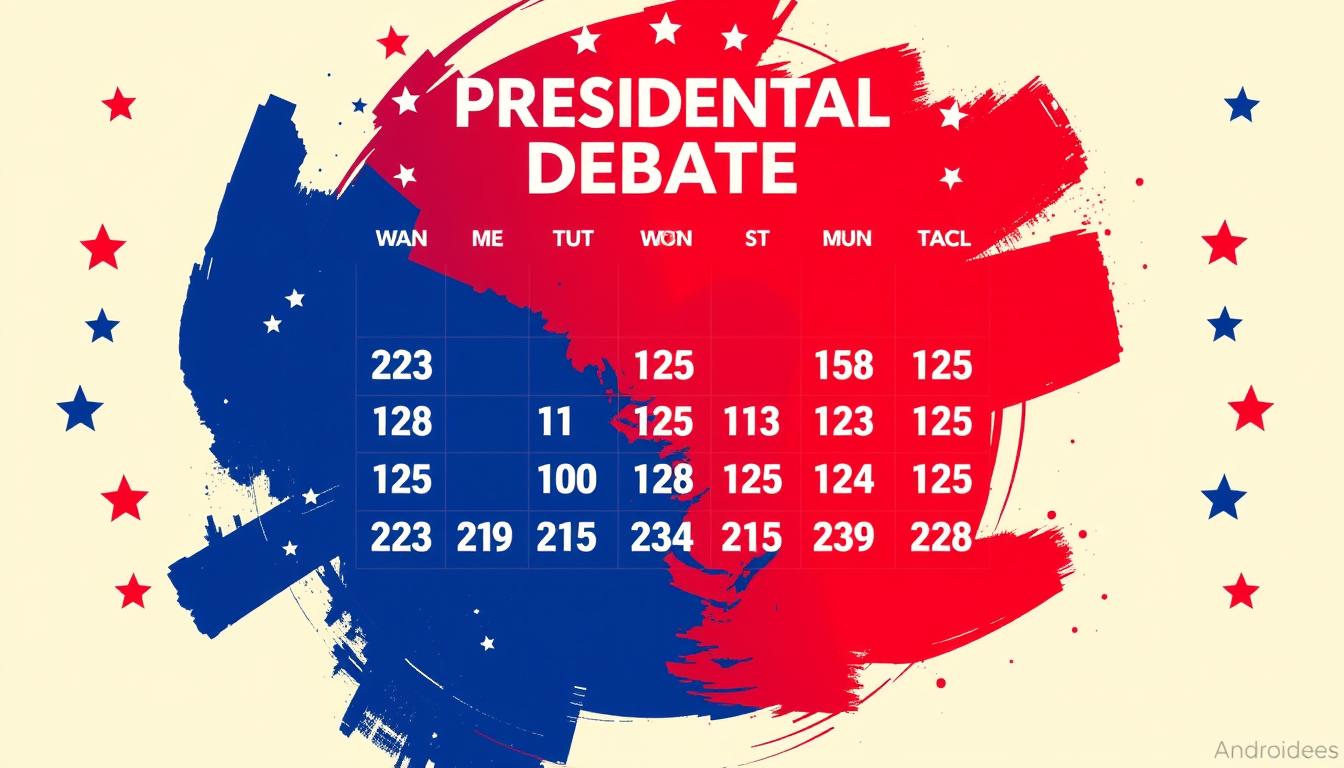Brace yourselves, America! The next presidential debate is approaching. 2020 also had a record high of 73.1 million viewers watching the debates. These debates are crucial in knowing the contenders and the strategies they employ.
The focus of this article is the debate timetable, the type of the debates and their significance. We encourage political buffs and first-time voters to read it because it’s relevant as it deals with upcoming debates that may shape the politics of America.
In what order will the Presidential Debates be conducted?
The US presidential election is approaching fast and the debates are one of the most important things. Through these platforms, the candidates get to present their plans and address key issues. They also expose voters to how the candidates articulate and consider key issues. This is how the debate schedules are designed.
Key Dates and Locations
The debates happen before the election, so voters can make smart choices. This year, the debates are set for:
- First Debate: September 29, 2023 in Miami, Florida
- Vice Presidential Debate: October 11, 2023 in Salt Lake City, Utah
- Second Debate: October 19, 2023 in Philadelphia, Pennsylvania
- Third Debate: October 27, 2023 in Nashville, Tennessee
Debate Formats and Topics
All debates have their own special method of allowing the candidates to speak. Such topics include the economy, foreign affairs, and health care. The format of the debates is comprised of opening exchanges, debates, and direct interactions between the debates participants.
| Debate | Format | Topics |
|---|---|---|
| First Debate | 90-minute moderated discussion | Domestic policy |
| Vice Presidential Debate | 90-minute moderated discussion | Foreign policy and national security |
| Second Debate | Town hall-style with audience questions | A range of issues selected by the moderator |
| Third Debate | 90-minute moderated discussion | Leadership and character |
As the presidential debate schedule comes up, we can expect lively and informative talks. These debates will help voters understand the candidates and the big issues facing the country.
Understanding the Presidential Debate Format
Get ready, for the presidential debates are just around the corner, however, it is important to know how the format and regulations work. The debate format is organized and aims to be fair. It helps the candidates present their vision and policies and converse with one another directly.
Rules and Regulations
The debates have clear rules to make sure everyone is treated equally. These rules cover things like how much time each segment gets and what’s expected of the candidates.
- Time Management: Debates are split into segments with set time limits for answers and discussions.
- Candidate Behavior: Candidates must be civil, not interrupting or attacking each other. Respect is key.
- Moderator’s Role: Moderators help keep the debate on track, follow the rules, and make sure ideas are shared fairly.
- Topics and Questions: The topics and questions are chosen to cover important issues. This helps voters understand where candidates stand.
| Debate Format | Description |
|---|---|
| Opening Statements | Candidates have time to share their main points and vision for the country. |
| Questioning Segments | Questions are asked, and candidates have time to respond and discuss further. |
| Closing Statements | Candidates get to summarize their views and appeal to voters in their final remarks. |
Knowing the debate format and rules helps us understand the debates’ importance. It lets us have informed discussions about the candidates and their policies.

presidential debate time: Your Guide to Tuning In
It is time for the presidential debates. This is a much-anticipated event where everyone wants to see how each candidate performed. But how will people be able to view the debates? Will it be through streaming online or via the Television channels? This article will surely assist you in not missing a single second.
Watching the Debates Through Streaming
People are able to utilize various platforms to watch these debates live if they have access to an electronic device. Numerous news channels including ABC, CBS, NBC, CNN, and Fox News are providing free live streams of the events on their websites and mobile applications which you can do so from anywhere online.
There are also streams available on YouTube, Twitter and Facebook. This allows you to stay updated on social media sites that you love the most.
Tuning in on Television
For those who like watching on TV, the debates will be on major networks. They usually air during prime time, making it easy to watch.
- ABC, CBS, NBC, and Fox will broadcast the debates live.
- Cable news channels like CNN, MSNBC, and Fox News will also show the debates.
- Check your local listings or network websites for exact times and channels.
Engaging with the Debates
There are several methods for participating in the discussions. News organizations will provide updates and commentary, often as events unfold. This way, you can always be up to date and identify any mistakes.
The interaction on social networks will be the interaction in the frenzy of events. It’s an opportunity to converse with other people and express yourself.
Being able to witness the candidates stand up to each other is important whether they are streaming online or sitting in front of a television. When people are active and take interest, the doughnut is beneficial for the future of the nation.
Presidential Debates — Canvassing: The Most Important Events
Debates preceding the election and the presidential campaigns which follow them are critical determinants of the electoral choices made by voters and the election process in the USA. These are primarily used by candidates to demonstrate their policies and leadership styles. They also demonstrate depictions of how presidential candidates would be capable of addressing critical challenges affecting the country.
Impacting the Decision in the Selection of the Elect
This is an opportunity for voters who have not made up their minds to see the candidates in one place. The more the voter observes the performance of the various presidential contenders, the better plans the voter will understand. This enables voters to take positions which will serve their own ideals and objectives.
Presidential debates also raise great questions that need to be addressed among voters. This would in turn increase the engagement and awareness of people. It strengthens the grass-roots of democracy.
- The debates give candidates a chance to share their plans and answer questions.
- Voters can see how well candidates communicate and handle questions.
- The debates can change the minds of undecided voters, affecting the election’s outcome.
| Impact of Presidential Debates | Percentage of Voters Influenced |
|---|---|
| Reinforced existing voting intentions | 60% |
| Changed voting intentions | 20% |
| Remained undecided | 20% |
The table shows how big of a deal presidential debates are for voters. A lot of people either decide to vote for someone else or stay unsure after the debates. This shows how important these debates are in deciding who wins the election.

Preparing for the Debates: A Candidate’s Perspective
More than ever, presidential candidates have their work cut out for them in the run-up to presidential candidate debates, since a lot is at stake. Debates allow the candidates to sell themselves to the voters while also attempting to distinguish themselves. They put a lot of effort into honing their messages and also prepare for scenarios that require critical thinking.
Gaining knowledge through research and analysis forms a key component of preparing for a debate. Such people follow their opponents’ previous actions pitting policies against each other. This enables them to locate vulnerabilities and develop solid responses. Knowing what hard questions need to be answered allows candidates to be more confident when the real debate starts.
So is the need to better the communication aspects. The objective of the candidates is simple: be articulate and answer questions concisely while remaining within the confines of the debate format. A lasting impact is what they all aim for and hence why there was considerable focus on their delivery, body language and voice during training.
Such debates define the electoral outcome, and the viewers know this all too well. This strenuous background work that all candidates have had to go through in preparation only serves to highlight their rationale and strategic perspectives. This effectively allows voters to read how candidates have prioritized and would prioritize future challenges.
Asking and discerning during the debates:
Factcheck and analysis techniques Besides post-zemin debates, fact-checking and evaluation remains pertinent. It is vital in disentangling truths from falsehoods. Media and independent organizations put a lot of effort to flag candidates who make claims. In this way, audience is well equipped with all facts for voting purposes.
Fact-checking – separation of perceptions and actualities
When attending debates, observe with a lot of caution. What are the candidates saying? Websites such as PolitiFact, Fact Check, etc, and some mass media give help a great deal in doing Check outs. They assist in distinguishing genuine facts from fictitious statements.
An in-depth analysis of what candidates profess entails analysis of very fundamental vent issues. This understanding assists in making a right voting decision. The platforms do in this case assist the user in avoiding the noise that realistic ought to be avoided to I election campaigns. Focus therefore now shifts onto what indeed matters in elections- Real policy debates.
FAQ
When is the next presidential debate?
What is the presidential debate schedule?
How do the presidential debates work?
How can I watch the presidential debates?
Why are the presidential debates important?
How do presidential candidates prepare for the debates?
How can I fact-check and analyze the presidential debate performances?

I’m a writer at Android Authority and Androidees with a keen focus on current news, wearables, how-to guides, and evergreen content.

